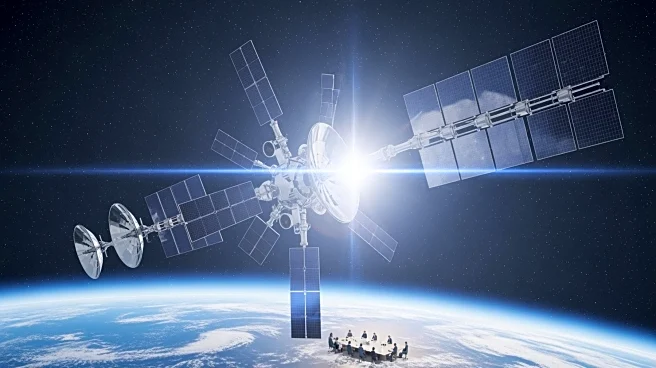What's Happening?
Reflect Orbital, a California startup, plans to launch 4,000 mirrors into orbit to redirect sunlight to solar farms at night, aiming to maximize energy output. The company has applied for a Federal Communications
Commission (FCC) license to launch a demonstration satellite, EARENDIL-1, in April 2026. The satellite will feature a large mirror to direct sunlight to Earth. The plan has raised concerns among astronomers and wildlife experts due to potential light pollution and ecological impacts. Critics argue that the reflected sunlight would be significantly dimmer than natural sunlight, requiring thousands of satellites for effective illumination.
Why It's Important?
The proposal by Reflect Orbital could have significant implications for astronomy and wildlife. Light pollution from the mirrors could hinder astronomical observations, affecting research on faint celestial objects. The ecological impact includes disruption of natural day-night cycles, affecting animal behavior and circadian rhythms. The plan also raises questions about the feasibility and effectiveness of using mirrors for energy generation. The scientific community is concerned about the potential disruption to both natural and scientific environments, highlighting the need for careful consideration of such large-scale projects.
What's Next?
Reflect Orbital's FCC license application is pending approval, and the company plans to conduct an environmental impact assessment. Scientists and regulators will likely scrutinize the proposal, considering the potential consequences for astronomy and ecology. The startup's plan may face opposition from environmental and scientific groups, who may advocate for stricter regulations on space-based projects. The outcome of the FCC's decision will determine the project's future, and ongoing discussions will focus on balancing technological innovation with environmental preservation.
Beyond the Headlines
The proposal by Reflect Orbital highlights the growing interest in space-based solutions for energy generation. It raises ethical questions about the use of space for commercial purposes and the potential impact on Earth's environment. The project underscores the need for international cooperation and regulation in space activities, as the effects of such projects extend beyond national borders. The debate over the mirrors reflects broader concerns about the commercialization of space and the need to protect natural resources and scientific research.










